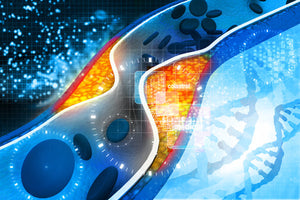Probiotics & Cholesterol
March 26, 2018

Are probiotics able to balance cholesterol in the human body if a person has eaten too much red meat or high cholesterol forming foods during his/her life for a period of time and now suffers from high cholesterol? Do probiotics help balance out this kind of high cholesterol? These are questions that we are often asked as people become more aware of their health and longevity.
So, how do probiotics balance out excess cholesterol in the human body?
Well, scientists discover new health benefits associated with probiotics every day. Now researchers think probiotics can support the body’s own natural cholesterol-reducing mechanisms.
Cholesterol is a waxy, fatty substance that occurs naturally in the body and is found in many foods. Animal products, such as meat and full-fat dairy products, contain cholesterol. It’s also found in some tropical oils like palm oil and coconut oil often found in baked goods.
While many people think of cholesterol as bad, it actually performs important functions in the human body. Cholesterol strengthens cell membranes, for example. Cholesterol is so important to human health that, if a person did not eat any foods containing cholesterol, the body would produce the cholesterol it needs to function. It’s only when there is too much that it becomes a problem.
The body also has natural mechanisms to get rid of excess cholesterol. Over-consumption of foods high in cholesterol can overwhelm these natural mechanisms, leading to high cholesterol levels. Probiotics can help support the natural cholesterol-lowering mechanisms.
ABOUT CHOLESTEROL AND ITS EFFECTS ON THE BODY
Cholesterol is associated with serious health problems, including heart disease. Cholesterol and plaque can accumulate inside arteries to cause atherosclerosis, a condition where the accumulation of cholesterol and plaque limit the flow of oxygen-rich blood to the body. Restricted blood flow to the heart can cause a heart attack.
High cholesterol levels increase the risk of heart disease, according to the Centers for Disease Control and Prevention (CDC). In fact, people with high cholesterol have about double the risk of heart disease than people with normal cholesterol levels. As you may know, heart disease is the leading cause of death in the United States, causing about one in four deaths in the nation each year.
Regular exercise, eating a low cholesterol diet, and quitting smoking can help lower cholesterol. The human body also has natural mechanisms to control cholesterol levels; new research suggests probiotics can support these natural mechanisms.
HOW PROBIOTICS MAY SUPPORT NATURAL CHOLESTEROL-LOWERING MECHANISMS
Bile is a water-soluble byproduct of cholesterol production. This green-yellowish liquid contains mostly cholesterol, bile salts, and bilirubin, but also contains water and electrolytes, such as potassium and sodium. Bile is actually a byproduct of the liver’s cholesterol production.
The liver excretes bile to the gallbladder for storage, the gallbladder then secretes it as needed into the digestive tract to aid in the digestion of lipids in the small intestine. The gallbladder reacts to food by releasing bile into the duodenum, where the bile breaks down fat.
Bile breaks down fats to make it easier for the body to absorb those fats. Without bile, the body could not absorb fat-soluble substances, such as the vitamins A, D, E, and K. Instead, these valuable nutrients would pass through the digestive tract and leave the body via feces.
Special processes in the liver combine the bile acids in bile with glycine or taurine to make bile salts. This combination, known as conjugation, makes it easier for the small intestine to absorb cholesterol from food. In other words, conjugated bile salts can increase cholesterol.
Probiotics actually break down these conjugated bile salts before the body can absorb the cholesterol. In other words, probiotics make it harder for the intestines to absorb cholesterol. Instead of being absorbed back into the body, the cholesterol leaves the body during a bowel movement. In one study a Lactobacillus-based probiotic was shown to produce the same enzyme that our bodies use (bile salt hydrolase or BSH) to break down bile salts thus improving the elimination of cholesterol. In other studies, Lactobacillus-based probiotics were shown to remove cholesterol by binding it to themselves. When the bacteria bind the cholesterol, it’s less likely to be absorbed by the body to affect your blood cholesterol levels. The researchers believe that the bacteria may benefit from the cholesterol and use it to strengthen their cell membranes. In this symbiotic relationship, the bacteria benefit from it while helping the human host to reduce the available cholesterol in their body. In yet another study, researchers found another way that Lactobacillus acidophilus, Lactobacillus bulgaricus and other beneficial bacteria were converting or breaking-down cholesterol into coprostanol which is also eliminated from the body through bowel movements. It’s important to mention that most of these studies were done “in vitro” meaning in a laboratory test-tube or culture dish and not in human trials, but these types of studies are what pave the way to future human clinical trials and provide the ground-breaking work for better understanding how probiotics can benefit every one of us.
Natren provides a full range of probiotic products that contain many of the probiotics included in this research. Natren Probiotics also impart a number of other health benefits for optimal health and well-being. While we are careful to point out that probiotics alone will not necessarily lower your cholesterol levels, research indicates that a consistent gut health regimen, including strategic probiotic supplementation, is key to maintaining health & longevity.
The post Probiotics & Cholesterol appeared first on Natren Probiotics Blog.





Leave a comment